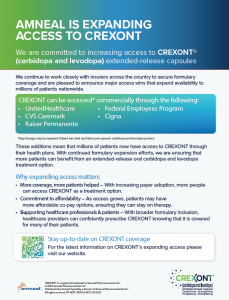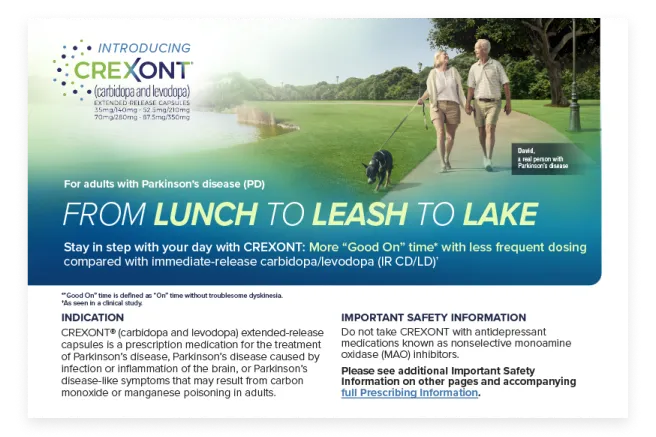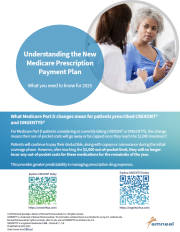Resources
Explore helpful resources

For your practice
Review the access and educational materials below to better support your practice.
Access Tip Sheet
See useful suggestions for writing a Letter of Medical Necessity, Letter of Appeal, or Letter of Medical Exception.

Letter of Medical Necessity

Letter of Appeal

Letter of Medical Exception

Amneal is Expanding Access to CREXONT
We’re committed to helping more patients access CREXONT. That’s why Amneal is actively partnering with insurers across the country to broaden formulary coverage.
We’re proud to announce that CREXONT is now available through a growing number of commercial plans, including Kaiser Permanente, Cigna, UnitedHealthcare, CVS Caremark, and the Federal Employees Program. In addition, patients covered under Tricare and the Veterans Affairs Healthcare system now have access, further expanding availability to those who may benefit most.
Tricare Uniform and VA National Formulary
Learn how expanded coverage is supporting veterans and military families. Patients covered under TRICARE Uniform and the Veterans Health Administration now have affordable access* to CREXONT, offering personalized extended-release treatment to help manage Parkinson’s symptoms.

CREXONT commercial coverage brochure
Discover how expanded coverage is making CREXONT more accessible. Learn about recent formulary wins that help bring this personalized extended-release treatment to millions of patients across the country.

Dosing and educational resources
See the dosing and online resources below.
The Expert Institute for Parkinson's Disease

CD/LD=carbidopa/levodopa; IR=immediate-release; PD=Parkinson’s disease.
For your patients
Share these materials with your patients to help them learn about CREXONT.
Considering CREXONT Brochure

Newsletter: THRIVE
Tell your patients about the THRIVE newsletters, which cover topics for people living with PD and their care partners.

Understanding the New Medicare Prescription Payment Plan
Share with your patient’s details on the changes to the out-of-pocket prescription drug costs if they are enrolled in the Medicare Part D Prescription Program.

Connect with Amneal to ask questions
IMPORTANT SAFETY INFORMATION
Indications and Usage
CREXONT® (carbidopa and levodopa) extended-release capsules for oral use is indicated for the treatment of Parkinson’s disease, post-encephalitic parkinsonism, and parkinsonism that may follow carbon monoxide intoxication or manganese intoxication in adults.Dosage and Administration
- Levodopa-naïve patients: Starting dose is 35 mg carbidopa/140 mg levodopa taken orally twice daily for the first three days; thereafter, dosage may be increased gradually as needed
- For patients converting to CREXONT from immediate-release carbidopa/levodopa, dosages are not substitutable on a 1:1 basis. See full prescribing information Section 2.2 for instructions
- For patients converting from Rytary® (carbidopa and levodopa) extended-release capsules, initiate CREXONT on an approximately 1:1 mg basis using the levodopa component for conversion
- CREXONT may be taken up to four times daily. The maximum recommended daily dosage is 525 mg carbidopa/2100 mg levodopa
- CREXONT may be taken with or without food. Capsules should not be chewed, divided or crushed
- CREXONT should not be taken with alcohol
Contraindications
Nonselective MAO inhibitors.Warnings and Precautions
- CREXONT may cause falling asleep during activities of daily living, somnolence or dizziness. Patients should avoid activities that require alertness such as driving and operating machinery until they know how CREXONT affects them
- It is important to avoid sudden discontinuation or rapid dose reduction to reduce the risk of withdrawal symptoms such as high fever or confusion. Patients who are discontinuing CREXONT should taper off with healthcare provider guidance
- Consider dose reductions or stopping CREXONT in patients with hallucinations or impulse control disorders (e.g., gambling, sexual urges, or uncontrolled spending)
- Consider dose reduction in patients with dyskinesia
- Patients with a major psychotic disorder should not be treated with CREXONT
- Monitor patients with a history of cardiovascular disease for cardiac function
- Monitor patients with a history of peptic ulcer for upper GI hemorrhage
- Monitor patients with glaucoma for increased intraocular pressure
Adverse Reactions
The most common adverse reactions (incidence ≥ 3% and greater than immediate-release CD/LD) are nausea and anxiety.Drug Interactions
Iron salts and dopamine D2 antagonists, including metoclopramide, may reduce the effectiveness of CREXONT.Use in Specific Populations
Pregnancy: Based on animal data, CREXONT may cause fetal harm. There are no adequate data on the developmental risk associated with the use of CREXONT in pregnant women.Breastfeeding: The developmental and health benefits of breastfeeding should be considered along with the mother’s clinical need for CREXONT.
Geriatric patients: There were no differences in safety outcomes between patients less than 65 years of age, 65-75 years of age, or 75 years and older.
To report SUSPECTED ADVERSE REACTIONS, contact Amneal Specialty, a division of Amneal Pharmaceuticals, LLC at 1‑877‑835‑5472 or the FDA at 1‑800‑FDA‑1088 or www.fda.gov/medwatch.
Please see full Prescribing Information for CREXONT.
Content is for guidance only. Please use clinical judgment when prescribing CREXONT. Dosage is individualized for each patient.

